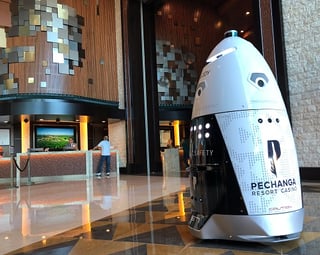Innovative Hospitality Companies Turn to Robots to Augment Workforce
With record-low unemployment and rising wages, innovative hospitality companies are turning to automation as they strive to meet and exceed guest expectations.
Automating services and operations is a top strategic goal for 21% of restaurants, and 8% plan to invest in automation, according to HT's 2019 Restaurant Technology Study.
Restaurants are using robots in both back of house and customer facing applications. Patrons at Le 1616 in Montreal are dazzled by the robotic bartender’s mixology skills and sense of wit. In Boston, four Massachusetts Institute of Technology grads created Spyce Kitchen (www.spyce.com), which has a robotic kitchen that prepares, cooks and cleans up after meals. Southern California burger chain CaliBurger has garnered attention for its use of Flippy, an autonomous robotic kitchen assistant developed by Miso Robotics that works alongside kitchen staff to assist in consistently preparing freshly cooked burgers and fries.
“The collaboration … demonstrates how AI-driven robotics will improve food quality, decrease food production costs, and improve the lives of workers in the food industry,” said John Miller, CEO of Cali Group, in a statement.
It’s been a successful venture. The burger chain plans to add Flippy to most all of its U.S. locations by the end of the year. Curious guests are coming in to take photos of and with the robots. At Pechanga Resort and Casino, guests can often be seen taking selfies with the roving security robot from Knightscope, the K5, as it moves about the property.
Pechanga Resort and Casino deployed the security robots earlier this year. “We believe it’s critical in today’s environment that we vet and use the latest strategies and tactics to keep our guests and team members safe. We’ve seen what the Knightscope robots can do - detect things the human eye cannot. It’s just one of the new safety tactics we’re utilizing to help us protect our expanded operations,” said Jared Munoa, President of the Pechanga Development Corp.
Pechanga has a 300-person security team that undergoes rigorous police academy-style training. “They see the robots as one more tool they have to keep guests and team members safe,” says Munoa.
Editor's Note: HT takes a look at the most innovative hotels and restaurants of 2019 in this HT exclusive, Mission Innovation.








